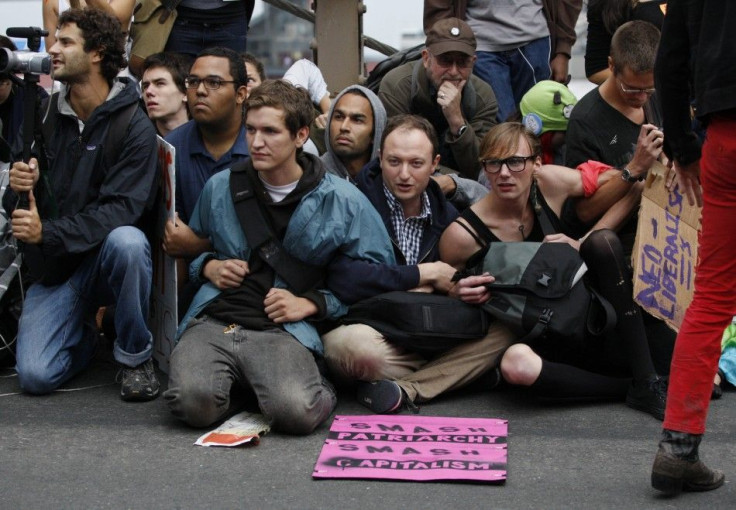As Occupy Wall Street Grows, A Question of What Happens Next

Occupy Wall Street is growing. Solidarity protests are spreading to cities across the country, a coalition of community groups and the Transit Workers Union have lent their support, and the mass arrests of protestors over the weekend received ample media coverage.
So far, the protestors camped out in Zuccotti Park have deliberately eschewed a hierarchy or a specific message, operating instead on an inchoate sense of outrage at Wall Street thriving and enjoying outsize political influence. But as the demonstration gains momentum and institutional support, the protestors may need to alter their tactics if they want to have staying power.
It's the nature of protests of this kind, especially on the left, that they have the cry of rage, the cry of alarm, but in order to become much bigger they need to become more organized and have a somewhat more coherent set of demands, said Michael Kazin, a professor of history at Georgetown University. Right now they are living off the energy of all the people doing this and it being still fairly new and exciting, but when it gets colder they're not going to hang out for months on end.
Kazin said that the Occupy Wall Street demonstrations derive much of their energy from young people facing dismal job prospects and a tattered social safety net, a disillusionment he saw in similar protests in Europe and hears from his students. But translating that broad appeal into change may require the protestors to eventually ally themselves with existing institutions. Kazin noted that the labor movement and the civil rights movement began outside the mainstream before aligning themselves with political parties.
Sooner or later, every demonstration has to get more institutionalized, Kazin said. It doesn't have to become part of the Democratic party the way the Tea Party is part of the Republican party -- it's important to have tension between movements and the major parties -- but if this lasts into the election year, they'll face the question of what to do about Obama what to do about the Democrats.
By forging an alliance with the Transit Workers Union, the Occupy Wall Street demonstrators have tapped into a traditional bastion of support for progressive causes. But they also run the risk of narrowing their focus or demands.
If anything, some of the protestors are anxious about this level of union support, said Alex Vitale, an associate professor of sociology at Brooklyn College and one of a number of faculty members there who have been helping the protestors. I think that there is a chance that it will change the character of this thing, that it will become more difficult to have a loosely organized, consensus-based approach.
That tension is inevitable as movements based on a sense of collectivism or rejecting authority evolve, said Todd Gitlin, a professor of journalism and sociology at the Columbia University School of Journalism. He said that Occupy Wall Street's wariness of authority reflects a broad belief that the entire political system is complicit.
The same sensibility that's suspicious of corporations, they're suspicious of political organizations that in their eyes lack legitimacy because they've been colluding in a process of leading the economy, with impunity, over a precipice, Gitlin said. Suspicion of authority is not just the spirit of such a movement; it's at the core of it.
Gitlin likened the protest in its current state to energy without a machine, and he said the protestors would need to reconcile themselves to cooperating with some sort of institution, whether it is a union or a progressive network like Campaign for America's Future, which kicked off its Take Back the American Dream conference this week with a discussion on Occupy Wall Street.
The structural people would have to live with people camped out in the park and leadership that's up for grabs and unruly things happening, and the occupier types would have to live with the fact that the structure people want things done in a structured way, Gitlin said. The structured people aren't interested in Occupy Wall Street; they're interested in changing laws.
Prominent commentators like Nicholas Kristof have begun to offer advice to Occupy Wall Street, and the Washington Post's E.J. Dionne suggested that the fledgling movement could offer the left's counterpoint to the Tea Party's right wing populism. Gitlin noted that the Tea Party had the significant advantage of influential institutions and supporters -- there's no left-wing equivalent of the Koch brothers or of FreedomWorks, he said - but the comparison is not entirely off.
This is more of an outsider movement, so it has a particular set of hurdles, Gitlin said. But that said, we're talking about a similar dynamic in which what Occupy Wall Street will have to do to sustain itself is to collect energies from outside and put them to work actually pressing for results from inside institutions, specifically Congress.
You can contact the reporter at j.white@IBTimes.com
© Copyright IBTimes 2024. All rights reserved.











